Fantasy fiction is a journey to a place nobody has ever been in waking life, a chance to meet the locals (unfriendly), sample their traditional wares (murder) and take in the picturesque scenery (volcanos and blasted wastelands). The most common destinations of fantasy fiction are rooted in Medieval Europe, a tradition that began with romances like Amadis of Gaul and Orlando Furioso and was revivified (with a sizable dash of Germanic and Celtic folklore) by Tolkien’s Middle-earth. Worlds drawing on Europe remain the most popular ports for the fantasy tourist.
The Tiger and the Wolf, my new novel from Tor UK, draws on other times and places—pre-Colombian America, the early bronze age, even palaeontological deep time. Similarly, although it’s always fun to spend a weekend break watching rival kings brain one another and spoil each other’s weddings, there are plenty of worlds off the beaten track for the intrepid tourist.
Roughing It
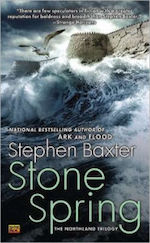 If you’re in the mood for an extreme holiday, why not the Stone Age? The facilities aren’t up to much, accommodations can be rustic, the locals are poor conversationalists, and the choice of souvenirs is limited. Nonetheless, the dawn of humanity can be an exhilarating trip for the hardy traveller. The destination they put on the front of all the brochures is Jean M. Auel’s The Clan of the Cave Bear, with its twilight of the Neanderthals and rise of their new neighbours. If you prefer a destination with a little more of the fantastical, try Julian May’s The Many-Colored Land, with its cast of lordly elves and shapechanging monsters. Technically it’s a science fiction setting, but you need to check your mobile phones at the portal. Or, if you prefer really getting some grit under your nails, try the turbulent climate of Stephen Baxter’s Stone Spring. Pack your swimsuit, because if your resort isn’t by the sea today, it will be before the end of your trip…
If you’re in the mood for an extreme holiday, why not the Stone Age? The facilities aren’t up to much, accommodations can be rustic, the locals are poor conversationalists, and the choice of souvenirs is limited. Nonetheless, the dawn of humanity can be an exhilarating trip for the hardy traveller. The destination they put on the front of all the brochures is Jean M. Auel’s The Clan of the Cave Bear, with its twilight of the Neanderthals and rise of their new neighbours. If you prefer a destination with a little more of the fantastical, try Julian May’s The Many-Colored Land, with its cast of lordly elves and shapechanging monsters. Technically it’s a science fiction setting, but you need to check your mobile phones at the portal. Or, if you prefer really getting some grit under your nails, try the turbulent climate of Stephen Baxter’s Stone Spring. Pack your swimsuit, because if your resort isn’t by the sea today, it will be before the end of your trip…
Going East
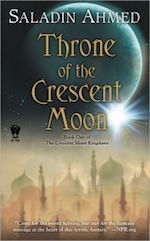 If Medieval Europe is too short on creature comforts, you can be assured of a genteel welcome in more easterly climes. Perhaps you want somewhere with music and poets, sophisticated architecture, silks, spices, and somewhere to shop. Many fantasy views of the east are through the eyes of European-style visitors, but we’ve all been on holiday with those guys—they won’t eat the food, won’t learn the language, you wonder why they left home in the first place. You never get a proper feel for the place unless you see it through the eyes of the locals. Saladin Ahmed’s Throne of the Crescent Moon, a rich tapestry of Middle-Eastern-influenced religion, art, love, and life, is an excellent place to start. Or perhaps you prefer to go further afield than that? Barry Hughart’s Master Li Chronicles are a perambulation through an “Ancient China that never was” in the company of your guide, the world’s most irascible sage and private detective. For those who wish to go further from the historical than that, we recommend Ken Liu’s The Grace of Kings for a complex and active visit to a world influenced by the Han Dynasty. Plan for a long trip—it takes several decades to see everything.
If Medieval Europe is too short on creature comforts, you can be assured of a genteel welcome in more easterly climes. Perhaps you want somewhere with music and poets, sophisticated architecture, silks, spices, and somewhere to shop. Many fantasy views of the east are through the eyes of European-style visitors, but we’ve all been on holiday with those guys—they won’t eat the food, won’t learn the language, you wonder why they left home in the first place. You never get a proper feel for the place unless you see it through the eyes of the locals. Saladin Ahmed’s Throne of the Crescent Moon, a rich tapestry of Middle-Eastern-influenced religion, art, love, and life, is an excellent place to start. Or perhaps you prefer to go further afield than that? Barry Hughart’s Master Li Chronicles are a perambulation through an “Ancient China that never was” in the company of your guide, the world’s most irascible sage and private detective. For those who wish to go further from the historical than that, we recommend Ken Liu’s The Grace of Kings for a complex and active visit to a world influenced by the Han Dynasty. Plan for a long trip—it takes several decades to see everything.
The Iron Curtain
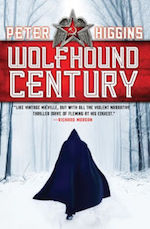 Since the end of the Cold War, of course, destinations that were formerly out of bounds are now tourist hotspots. Why not brave the hospitality of Eastern Europe, with its rich myths, complex history and confusing traditions? You can travel to Liz Williams’ Nine Layers of Sky without ever quite leaving modern-day Russia (be very careful that any keepsakes you acquire are not in fact portals to another world), or sign up for the Tsarist Oppression Experience of Peter Higgins’ Wolfhound Century. For the more fantastically inclined, Bulikov in Robert Jackson Bennett’s City of Stairs has a distinctly Eastern European flavour to it—just don’t get the locals talking about religion. Lastly, for travellers who want a real flavour of rural life straight out of a folk tale, the incomparable Naomi Novik’s Uprooted offers real Slavic peasant hospitality for any visitors who enjoy good food, stories and never, ever going into the woods under any circumstances.
Since the end of the Cold War, of course, destinations that were formerly out of bounds are now tourist hotspots. Why not brave the hospitality of Eastern Europe, with its rich myths, complex history and confusing traditions? You can travel to Liz Williams’ Nine Layers of Sky without ever quite leaving modern-day Russia (be very careful that any keepsakes you acquire are not in fact portals to another world), or sign up for the Tsarist Oppression Experience of Peter Higgins’ Wolfhound Century. For the more fantastically inclined, Bulikov in Robert Jackson Bennett’s City of Stairs has a distinctly Eastern European flavour to it—just don’t get the locals talking about religion. Lastly, for travellers who want a real flavour of rural life straight out of a folk tale, the incomparable Naomi Novik’s Uprooted offers real Slavic peasant hospitality for any visitors who enjoy good food, stories and never, ever going into the woods under any circumstances.
Toga Parties
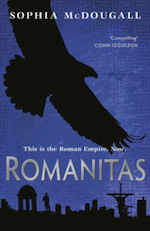 The Classical World has been a dream destination since the actual fall of Rome, and one that fantasy visits on many occasions. For the truly immersive Hellenic experience, join Latro in Gene Wolfe’s Soldier of the Mist in a whirlwind tour of the city-states, their personalities, gods, and monsters. Visitors are advised to retain their written itineraries, as the memory of your guide is notoriously fallible. For a more active holiday, David Gemmell’s Lion of Macedon lets you witness the rise of Phillip and Alexander with dark magic hiding around every corner, whilst John James’ Votan takes you on a trip from the heart of the Roman Empire all the way north to the beginnings of Germanic myth. For those who feel that, plumbing and philosophy aside, the ancient world remains somewhat inhospitable for a 21st-century traveller, we recommend Sophia McDougall’s Romanitas, all the social inequality and political skulduggery of the Roman world brought into the modern day.
The Classical World has been a dream destination since the actual fall of Rome, and one that fantasy visits on many occasions. For the truly immersive Hellenic experience, join Latro in Gene Wolfe’s Soldier of the Mist in a whirlwind tour of the city-states, their personalities, gods, and monsters. Visitors are advised to retain their written itineraries, as the memory of your guide is notoriously fallible. For a more active holiday, David Gemmell’s Lion of Macedon lets you witness the rise of Phillip and Alexander with dark magic hiding around every corner, whilst John James’ Votan takes you on a trip from the heart of the Roman Empire all the way north to the beginnings of Germanic myth. For those who feel that, plumbing and philosophy aside, the ancient world remains somewhat inhospitable for a 21st-century traveller, we recommend Sophia McDougall’s Romanitas, all the social inequality and political skulduggery of the Roman world brought into the modern day.
All Mod Cons
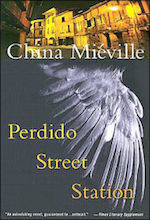 Some tourists, after doing the rounds of the castles, city states, towers, and the odd orc-laden spelunking expedition, prefer a destination with running water, working drains, and decent healthcare. As well as the traditional pomp and pageantry of the Middle Ages, fantastic holidays can also take you to somewhere closer to home in terms of facilities and conveniences. Why not try China Miéville’s Bas-Lag, as seen in Perdido Street Station? With a functioning public transport system, a world-class university, and some truly exotic night life, this is one of our most popular destinations. The solicitous government ensures that your first complaint will be your last. Alternatively, a visit to Aliette de Bodard’s The House of Shattered Wings allows you to stretch your money via the advantageous exchange rate that comes from the total magical devastation of Paris and much of the wider world. Sample French and Vietnamese street cuisine, have your picture taken with a fallen angel, and never leave your hotel without House-appointed bodyguards.
Some tourists, after doing the rounds of the castles, city states, towers, and the odd orc-laden spelunking expedition, prefer a destination with running water, working drains, and decent healthcare. As well as the traditional pomp and pageantry of the Middle Ages, fantastic holidays can also take you to somewhere closer to home in terms of facilities and conveniences. Why not try China Miéville’s Bas-Lag, as seen in Perdido Street Station? With a functioning public transport system, a world-class university, and some truly exotic night life, this is one of our most popular destinations. The solicitous government ensures that your first complaint will be your last. Alternatively, a visit to Aliette de Bodard’s The House of Shattered Wings allows you to stretch your money via the advantageous exchange rate that comes from the total magical devastation of Paris and much of the wider world. Sample French and Vietnamese street cuisine, have your picture taken with a fallen angel, and never leave your hotel without House-appointed bodyguards.
And we’ve barely scratched the surface—we haven’t even talked about African-influenced fantasy destinations such as David Anthony Durham’s Acacia series or N.K. Jemisin’s Egypt-inspired Dreamblood duology, or the Aztec feel of de Bodard’s Obsidian and Blood. Or what about a cruise round some islands? Ursula K. Le Guin’s Earthsea is perennially popular, but don’t neglect Frances Hardinge’s Gullstruck Island (The Lost Conspiracy in the US) or Terry Pratchett’s Nation. Or there’s special rates on a really, really gloomy weekend break in gothic Gormenghast… Fantasy fiction is, after all, the gateway to countless destinations, from the near-historical to the surreal and bizarre, with more added to the brochure every day.
Adrian Tchaikovsky’s new novel, The Tiger and the Wolf, is out from Tor UK on February 11th. He is also the author of the Shadows of the Apt series, Guns of the Dawn, and the forthcoming Spiderlight, available August 2nd from Tor.com Publishing. You can find him on Twitter at @aptshadow.









